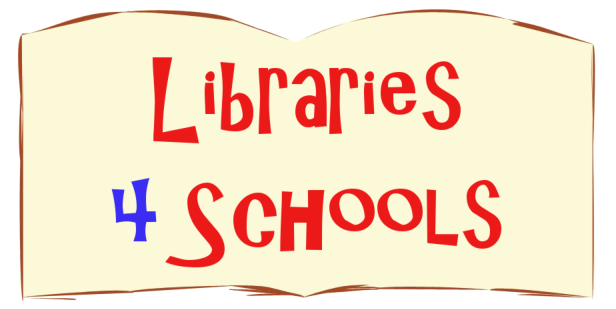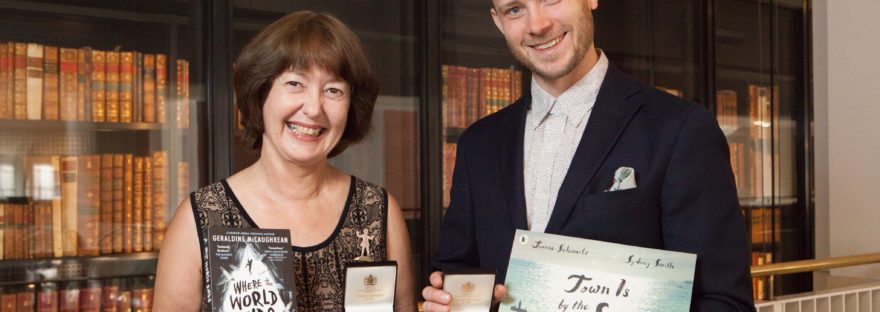The Carnegie and Kate Greenaway Award winners for 2018 were announced yesterday, as well as the Amnesty CILIP Honour commendations; this is the third year that the Medals are joined by the commendations, which are given to the book on each shortlist that most distinctively illuminates, upholds or celebrates freedoms.
Geraldine McCaughrean won the Carnegie Medal with her novel Where the World Ends; this is the eighth time she has been shortlisted, and the second time she has won, the first being thirty years ago in 1988 with A Pack of Lies.
Where the World Ends is a tale of survival inspired by a true story from the Scottish island of Hirta, St Kilda, in 1727. A group of men and boys are put ashore on a remote sea stac (‘stac’ being the Scottish spelling) to gather food, but then find themselves stranded when the boat fails to return. Surrounded by the ocean on each side, they must do all they can to survive.
Winning the Medal, McCaughrean stated: “When I won the Carnegie 30 years ago, it felt like a licence to go on writing – to call myself an author. I am almost ashamed of how much I wanted to win again – just to prove to myself that it wasn’t a fluke!”
Canadian illustrator Sydney Smith has illustrated multiple children’s books, and wins the Kate Greenaway Medal for the first time for his illustrations in Joanne Schwartz’s Town Is by the Sea, this being his second time nominated.
The picture book shows a boy growing up in a mining town in the 1950s, going about his day as he thinks about his father digging for coal in the dangerous mining pit under the sea. The contrast between the brightness of his life and the darkness of the pit is stark and striking, inspired by Impressionist artists such as Turner.
About his win, Smith said: “It is a dream come true to see my work, crafted from my heart, for family and my home to be honoured by the highest of praises. There is no better feeling than to be recognized for something that was created with sincerity and joy. I regard this honour as a challenge to continue to work with such tools.”
The Amnesty CILIP Honour commendations went to The Hate U Give the debut novel by Angie Thomas from the Carnegie shortlist, and The Song from Somewhere Else illustrated by Levi Pinfold from the Kate Greenaway shortlist. Both focus on themes of encouraging children to stand up for what is right and what they believe in.
The Hate U Give follows the story of a young girl who witnesses the fatal shooting of her unarmed best friend by a white police officer. What she decides to do will affect both her community and the lives of the people around her. Thomas stated: “I hope that the book helps young people to see themselves and see others from a new perspective and know that they have a voice that they can use to stand up for themselves, and others.”
The Song from Somewhere Else focuses on themes of bullying, friendship and betrayal; perfectly illustrated in black and white, this is Pinfold’s first time illustrating a novel. He said: “While working on the pictures for The Song From Somewhere Else I was routinely struck by how important kindness is for a person who can only see shadows and a world in black and white…I feel truly honoured that our book has been recognised by such a vital and life-preserving organisation.”
Geraldine McCaughrean gave a rousing speech at the ceremony, praising her fellow Medals nominees for portraying difficult subject matter, and appealing to authors and publishers not to dumb down language or ideas in children’s books, arguing that complex words are learnt through exposure.
She stated: “Since when has one generation ever doubted and pitied the next so much that it decides not to burden them with the full package of the English language but to feed them only a restricted diet, like poorly patients, of simple words?”
“The worst and most wicked outcome of all would be that we deliberately and wantonly create an underclass of citizens with a small but functional vocabulary: easy to manipulate and lacking in the means to reason their way out of subjugation, because you need words to be able to think for yourself.”
“In my opinion, young readers should be bombarded with words like gamma rays, steeped in words like pot plants stood in water, pelted with them like confetti, fed on them like alphabetti spaghetti, given Hamlet’s last resort: “Words. Words. Words.”
This message was supported by Jake Hope, chair of the Carnegie judging panel, who added that the librarians on the panel “heartily endorse Geraldine’s call for intellectual freedom through stories with rich language and complex themes that equip all children with the tools to understand – and, in some cases, change – the world around them”.
You can read more about the winning titles, the Medals and the shortlists on the Medal website here http://www.carnegiegreenaway.org.uk/2018-winners-announced.php.

